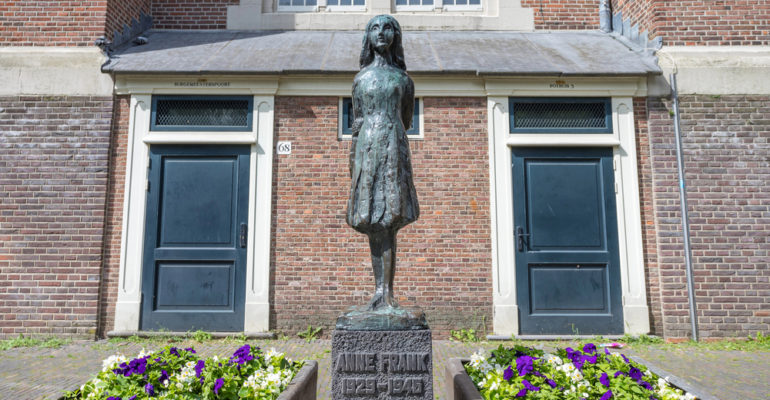Anne Frank’s Diary: Echoes of Resilience in Mental Health Advocacy
Anne Frank[1], the young Jewish girl whose diary[2] became a symbol of hope and resilience during the Holocaust, continues to inspire generations. Beyond her historical significance, this article explores the profound connection between Anne Frank’s life and the urgent need for leaders who embody her spirit in advocating for mental health and mental health care.
The Power of Expression: Anne’s Diary as a Mental Health Outlet
Anne Frank’s diary served as a crucial outlet for her emotions during the darkest times. Mental health leaders can draw inspiration from her use of expressive writing as a coping mechanism.[3] Advocating for the therapeutic benefits of creative expression contributes to a holistic approach to mental health care.
Resilience Amid Adversity: Lessons from Anne’s Courage
Anne’s resilience in the face of persecution highlights the human capacity to endure hardship.[4] Mental health leaders can emphasize the importance of resilience-building strategies in mental health care. Promoting coping mechanisms and tools for navigating adversity contributes to emotional strength and well-being.
A Voice for the Vulnerable: Mental Health Advocacy for Marginalized Communities
Anne’s experience as part of a marginalized community underscores the importance of mental health advocacy[5] for vulnerable populations. Mental health leaders can follow her example by advocating for mental health support tailored to the unique needs of marginalized communities. Addressing systemic inequalities contributes to a more inclusive mental health care system.
The Impact of Isolation: Lessons for Mental Health Support
Anne’s experience of living in hiding speaks to the mental health challenges of isolation. Mental health leaders can advocate for initiatives that address the impact of social isolation on mental well-being. Fostering connection, even in challenging circumstances, contributes to a supportive environment for mental health.[6]
Breaking the Silence: Destigmatizing Mental Health Conversations
Anne Frank’s decision to document her thoughts challenges the silence surrounding mental health. Mental health leaders can encourage open conversations about mental well-being, breaking down the stigma associated with seeking help. Creating environments where individuals feel safe to share their struggles contributes to a more compassionate society.
Advocacy for Mental Health Education
Anne Frank’s diary serves as a poignant educational tool, providing insights into the human experience during difficult times. Mental health leaders can advocate for the integration of mental health education in schools.[7] Equipping young minds with knowledge about mental well-being promotes emotional intelligence and resilience.
Remembering Trauma: Trauma-Informed Mental Health Care
Anne’s experience during the Holocaust highlights the lasting impact of trauma. Mental health leaders can advocate for trauma-informed care[8] that recognizes and addresses the effects of historical trauma. Creating safe spaces for individuals to process and heal from trauma contributes to a more empathetic mental health care approach.
Inclusive Mental Health Care for Youth
Anne Frank’s diary was written during her teenage years, emphasizing the importance of mental health support for youth. Mental health leaders can advocate for inclusive and accessible mental health care services for young individuals. Early intervention and support contribute to the long-term well-being of youth.
Encouraging Resilience Through Storytelling
Anne’s diary serves as a powerful narrative of resilience. Mental health leaders can emphasize the therapeutic value of storytelling in mental health care. Providing platforms for individuals to share their mental health journeys fosters a sense of connection, understanding, and resilience.[9]
Compassion in Leadership: Lessons from Anne’s Legacy
Anne Frank’s compassion for humanity even in the face of adversity is a model for leadership. Mental health leaders can prioritize compassionate and empathetic approaches in mental health care delivery. By fostering a culture of understanding and support, leaders contribute to creating a mental health care environment that values the dignity and well-being of every individual.
Conclusion: Anne Frank’s Enduring Legacy in Mental Health Advocacy
As the world grapples with the complexities of mental health, Anne Frank’s diary continues to resonate as a testament to resilience, courage, and the power of the human spirit. The world needs more leaders who, like Anne Frank, embody empathy, foster resilience, and advocate for mental health with unwavering compassion. By drawing inspiration from her enduring legacy, mental health leaders can contribute to creating a society where mental well-being is prioritized, conversations about mental health are open and destigmatized, and the journey to emotional healing is guided by empathy, understanding, and a commitment to the holistic well-being of all individuals. Anne Frank’s legacy remains a poignant reminder of the strength that can emerge from vulnerability and the transformative power of resilience in the realm of mental health advocacy.
[1] Müller, Melissa. Anne Frank: The Biography. A&C Black, 2013.
[2] Goodrich, Frances, and Albert Hackett. The Diary of Anne Frank. Dramatists Play Service, Inc., 1958.
[3] Mordechay, Daphna Sabo, Bracha Nir, and Zohar Eviatar. “Expressive writing-Who is it good for? Individual differences in the improvement of mental health resulting from expressive writing.” Complementary therapies in clinical practice 37 (2019): 115-121.
[4] Dagdeviren, Hulya, and Matthew Donoghue. “Resilience, agency and coping with hardship: Evidence from Europe during the great recession.” Journal of Social Policy 48.3 (2019): 547-567.
[5] Chapman, Simon. “Advocacy in public health: roles and challenges.” International journal of epidemiology 30.6 (2001): 1226-1232.
[6] Suen, I-Shian, Tracey L. Gendron, and Meghan Gough. “Social isolation and the built environment: A call for research and advocacy.” Public Policy & Aging Report 27.4 (2017): 131-135.
[7] Hoganbruen, Kathy, et al. “Effective advocacy for school-based mental health programs.” Handbook of School Mental Health Advancing Practice and Research (2003): 45-59.
[8] Forkey, Heather, et al. “Trauma-informed care.” Pediatrics 148.2 (2021).
[9] McDowell, Kate, et al. “Storytelling and/as Resilience.” Critical librarianship (2021).







